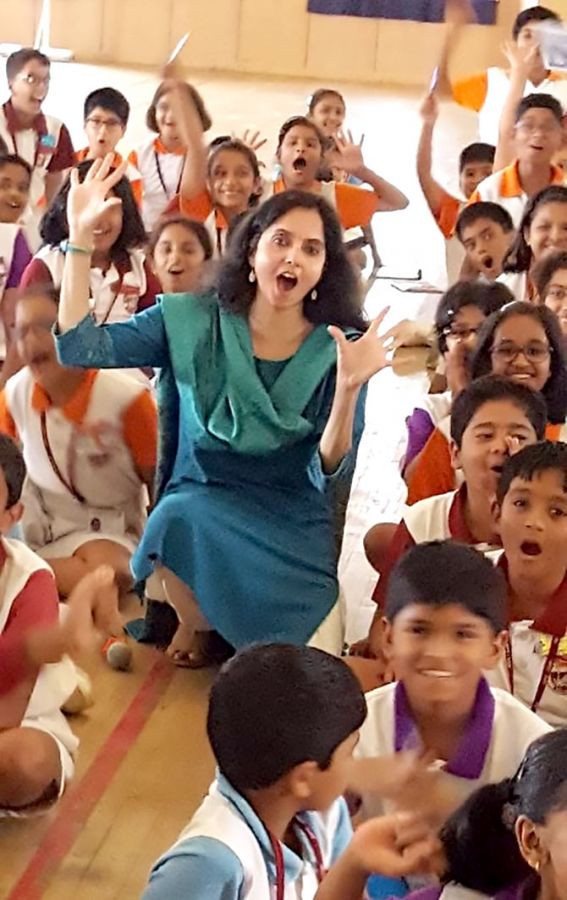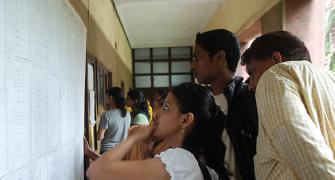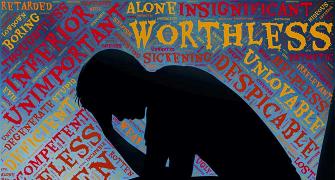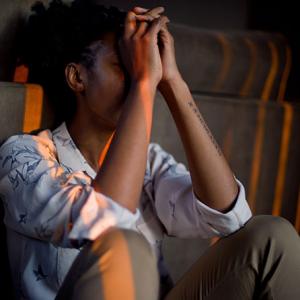'We will teach horse riding and swimming to our children. But when it comes to dealing with emotions, none of the parents or teachers will ask the child: "How are you feeling today?"'

A 2019 report from the World Health Organisation states that over 200 million people in India suffer from depression.
This means that, one in five Indians reading this, are currently suffering from signs of depression.
But how many of us actually talk about it? Or seek help from an expert?
 According to Anu Krishna, left, a NLP (neuro-lingustic programming) trainer, mind coach and zen lifestyle expert who works with teens and young adults, "Mental health is still a taboo in Indian society. People are embarrassed and not allowed to talk about it."
According to Anu Krishna, left, a NLP (neuro-lingustic programming) trainer, mind coach and zen lifestyle expert who works with teens and young adults, "Mental health is still a taboo in Indian society. People are embarrassed and not allowed to talk about it."
"If you say you are depressed, people will dismiss you saying: 'Arre, wo to pagal hai.' But they will not help you or take you to a doctor," says Anu.
"Fact is, we are living in a very lonely world. Most of us are not trained in dealing with disappointments and that can cause uneasiness in mental health. So it is very important to change this attitude towards mental health awareness. It's okay if people call me a mad woman. Someone has to do it. So I'm going to do this dirty work," says the Bengaluru-based co-founder of Unfear Changemakers LLP, an organisation that creates innovative solutions to deal with mental fitness.
In a telephone conversation with Divya Nair/Rediff.com, Anu Krishna highlights how social conditioning and unrealistic expectations among parents and teachers sets the ground for early depression among Indian teens and young adults.
The first of a two-part interview:
India is one of the leading countries in terms of number of people suffering from depression. What reasons do you attribute for this?
If you look at our education system it is mostly left-brained.
You go to school, perform like a trained circus animal, 'sab taali bajayenge (everyone will applaud).'
You write something else, you won't get marks.
If you do something different, you are a failure. This idea is lapped on them.
There is no scope for: Oh, there is a right brain too!
Why? Because involving the right brain would mean a complete system overhaul.
And we are an archaic society; we follow an archaic education system.
We will try all kinds of (academic) boards, teach horse riding and swimming to our children. But when it comes to dealing with emotions, none of the parents or teachers will ask the child: 'How are you feeling today?'
For instance, when I meet people, I never ask them how are you? I always ask: How are you feeling today?
I do this deliberately at home as well. I tell my husband and family: 'Am not feeling good andar se (from within)' and my husband would sometimes say: 'Oh, are you okay? But you ate na?'
So then I say it again: 'Am not feeling happy from within.'
Because I just want to express myself. And I want someone to hear it.
This change won't happen overnight, but we have to keep doing it.
Don't just qualify your feelings, quantify them.
A lot of people, young and old, are affected by actor Sushant Singh Rajput's death.
If you look at Sushant Singh, I have never been affected by a celebrity going down before.
In the last few hours, I have ranted on Facebook and social media. I've said: When will you people wake up?
He was so lonely and we all knew about it. But he just couldn't even reach out.
The way I look at it, he was probably badly bullied.
He was good at studies. He went to a good engineering school, dropped out to pursue what he liked. And he was doing well.
But if you look at these stars, you will see how much they have all been bullied by the system.
It is so subtle that it happens everywhere. In fact it starts right from school.
The ones who score well, do well in life are celebrated and applauded by everyone. So the average ones, who can't do well try to bully the others and pull them down.
Why? Because they want attention too. Instant gratification, we call it.
Then there are entrance examinations that bully you.
This bullying continues and happens across various stages of your life -- at the workplace, in families, in society.
Then you choose a career, get married maybe.
In between all this, where is the time to look at your own emotions and say: I DO NOT FEEL GOOD!
And there is no one to come and ask: Why are you not feeling good?
Instead, people mock you when you say 'I don't feel good, I don't feel happy from within.'
You are basically not allowed to say that.
It's a lonely world out there. So if your peers, family, teachers and society don't let you express your emotions, bachha jayega to jayega kahaan? (who will you seek help from?)

You work with teens and young adults. In your opinion, what are some of the issues they face that lead them to being depressed?
From what I hear, a majority of young Indians are possibly on anti-depressants. But we don't seem to care. Or want to talk about it.
So many parents come to me and say: 'Isko psychiatrist ke paas bhejna hai. Din bhar mobile aur TV mein ghusa rehta hai. Doston ke saath gaadi me ghumta hai. Koi cheez me interest nahi hai. (I want to take him to a psychiatrist. He is engrossed in his phone and TV all the time. He travels with his friends and doesn't seem interested about anything).
I ask them: As parents, what are you doing about it?
Most of them don't know what is happening around them.
So I tell them bluntly: 'Problem usko nahi, shayad aapko apne aapko change karna hai. (He is not the problem. You need to change).
The thing is adolescence is an exciting phase of life. All of us have been there.
We are full of adrenaline and want to try out new things.
Even if you stop them, they are going to try it out. Maybe they'll hide it from you or keep secrets.
So as parents, what you can do is make your value system stronger at home.
At the same time, don't try to overdo it. Make them comfortable enough that they can come back home and talk to you, confide in you.
Like if they go out drinking with friends and come back sober, they can tell you how they feel about it.
I have teens at home. They used to hide things from me.
When I realised that, I made some changes to myself. I became more friendly. And I could gradually see the difference it made to them.
My daughters became more confident. They started performing better at school.
But I have also seen some parents overdoing it. Like there was this father who said he treats his son like a friend. I asked him how does he do it?
He said: 'I wear cool Gucci, branded clothes like him. He calls me dude. We are friends. He can say anything he wants to me.'
I'm a little old school here maybe. So I said: 'But he also talks back at you. When was the last time he called you dad?'
I mean, I could be wrong, but what happened to respecting elders?
I'd say discipline is very important. So are basic family values.
You don't have to try so hard to be a friend. Or act his age. You can be a friendly parent.
This simple change will make them treat other people in a more kind and compassionate manner.
Disclaimer: All content and media herein is written and published online for informational purposes only. It is not a substitute for professional medical advice. It should not be relied on as your only source for advice.
Please always seek the guidance of your doctor or a qualified health professional with any questions you may have regarding your health or a medical condition. Do not ever disregard the advice of a medical professional, or delay in seeking it because of something you have read herein.
If you believe you may have a medical or mental health emergency, please call your doctor, go to the nearest hospital, or call emergency services or emergency helplines immediately. If you choose to rely on any information provided herein, you do so solely at your own risk.
Opinions expressed herein cannot necessarily provide advice to fit the exact specifics of the issues of the person requesting advice.









